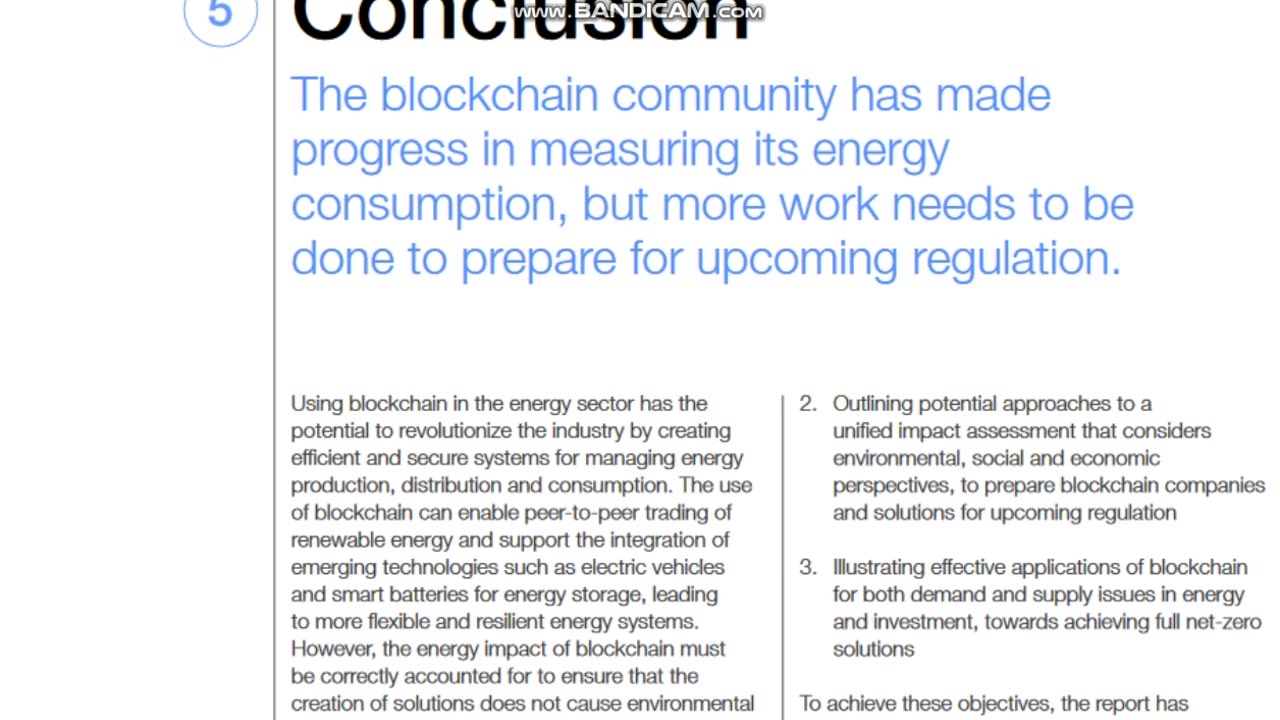Premium Only Content

ENERGYWEB TOKEN partnered with THE WORLD ECONOMIC FORUM
Executive summary
The world’s energy system is in dire crisis, and
developing the capacity to deliver net zero over
the next decade may be the most important
transition that humanity has ever needed to make.
Blockchain technology could potentially improve
the energy sector by enabling more efficient and
secure transactions, as well as promoting other
industries’ decentralization and encouraging the use
of renewable energy sources. However, to avoid
unintended negative consequences, it is important
to address issues such as high energy consumption
and the potential concentration of control in the
use of blockchain for energy. Additionally, careful
consideration should be given to the governance
and regulation of blockchain in the energy sector to
ensure its responsible use.
Blockchain has the potential to revolutionize
the energy sector by enabling the creation of
decentralized, efficient and secure systems for
managing energy production, distribution and
consumption. Through smart contracts, blockchain
can facilitate peer-to-peer trading of energy, making
it easier for individuals and businesses to generate
and sell renewable energy to their neighbours. This
can lead to the more efficient use of renewable
energy sources and reduce reliance on centralized
energy providers. Additionally, blockchain can
support the integration of emerging technologies
such as electric vehicles and smart batteries for
energy storage, providing more flexible and resilient
energy systems. WWW.ENERGYWEB.ORG
In order to deliver on these possibilities, however, the
energy impact of blockchain itself must be correctly
accounted for, ensuring that more environmental
harm is not caused by the creation of solutions
than is saved by them. The blockchain community
has done some excellent work that clarifies how
to measure the energy consumption of different
solutions; however, much remains to be done to
ensure that companies, solutions and protocols in
this space are ready for the emerging regulation.
The overall objectives of this report are, therefore:
(1) to outline guiding principles and provide an
overview of the current state of play related to
the environmental impact of certain blockchain
technologies; (2) to outline a potential approach
for a unified impact assessment that balances
economic, environmental and social perspectives
so that blockchain companies and solutions are
ready for the upcoming regulation, rather than
lagging behind it; and (3) to illustrate examples of
where and how blockchain has been effectively
applied to both demand and supply issues of
investment in energy and blockchain, moving
towards net-zero solutions.
-
 1:19:56
1:19:56
Gold Standard Digital Asset Hunter
27 days agoFirst Live Interview With Michael Saylor Since Bitcoin Hit $100K!
622 -
 1:45:25
1:45:25
The Quartering
2 hours agoHuge Update In Cybertruck Attack & Dark New Details From New Orleans Attacker & More!
37.9K19 -
 LIVE
LIVE
DemolitionDx
2 hours agochecking out multiple games
346 watching -
 2:14:38
2:14:38
Conspiracy Pilled
1 day agoPortal to Hell: The Elisa Lam/Cecil Hotel Case (S5 Ep 12)
2.01K2 -
 14:31
14:31
DeVory Darkins
1 day ago $3.94 earnedScott Jennings Drops Brutal TRUTH BOMB
8K113 -
 LIVE
LIVE
cbsking757
3 hours ago★TANKING RIVALS RANKED! GIFTED SUBS ARE LIVE! #marvel #marvelrivals
137 watching -
 4:04:55
4:04:55
Tate Speech by Andrew Tate
10 hours agoEMERGENCY MEETING EPISODE 99 - 2024 - TIME VACUUM
158K97 -
 26:14
26:14
Breaking Points
3 hours agoSH*TSHOW: FBI Retracts False Info on NOLA Attacker
23.4K25 -
 56:35
56:35
The Dan Bongino Show
5 hours agoReprise: Best Episode Of 2024 - 01/02/2025
220K1.08K -
 16:04
16:04
Tundra Tactical
2 days ago $0.78 earnedHow Palmetto State Armory got so BIG!
10.7K2